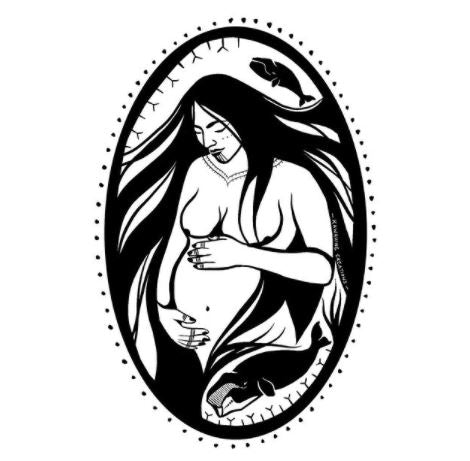Feature image by @kawahinecreations
Indigenous Peoples Day takes on a deeper significance this year, particularly here on Turtle Island, also known as Canada. The recent discovery of the remains of 319 children (and counting) at the former Kamloops and Brandon Indian Residential Schools has left the country in a state of mourning. When the news hit headlines last month, it served to underline, in the most devastating way, something we already knew: that there’s still so much work to be done to achieve equality.
It’s crucial that we take the unchangeable tragedies of Canada’s past today and use them to shape a better tomorrow for Turtle Island’s Indigenous community, to whom we owe so much. Education, understanding and perseverance are key factors in creating a society that favours equality over power; life over death.
In this blog, Brooke Bobb-Reid, the Maternal Child Health Program Lead at Seabird Island Band, highlights the inequality Indigenous mothers still face in 2021, and what non-Indigenous people can do to rally for equality.
Maternal Healthcare Inequality
First Nations pregnant women and mothers are still met with many barriers when it comes to receiving good quality maternal healthcare - an issue Brooke says is driven from many angles. “There are language barriers, transportation barriers, racism, fear around accessing care to primary healthcare providers, a lack of understanding of modern systems and a lot of unhealed previous trauma, for example previous births”, she says.
“There are still so many misconceptions about First Nations mothers - that they’re uneducated, are alcoholics, are less than, and incapable compared to other women.”
The problem, Brooke explains, stems from a lack of knowledge on the history of Indigenous peoples, which feeds an imbalanced understanding of the impacts of systemic racism. “This is a domino effect, and contributes dynamic impacts on our people. It interrupts the traditional teachings of our people, and has led to ingraining negativity towards health care and fear.”
Only earlier this month, 16 women shared their experiences of forced sterilizations occuring in Canada today, released in a report by a Senate committee on human rights. The report says coerced sterilization of Indigenous women is not a matter of the past.
“Some of the Indigenous women who were forced or coerced into sterilization live on reserves in remote areas. Hospitals are often a long distance away and require significant travel, sometimes by air,” the report says.
“Away from their family and communities to give birth, many Indigenous women experience language and cultural barriers. Many women are not given adequate information or support to understand and to be informed of their rights, including their sexual and reproductive rights.”
Read more about the report on globalnews.ca.
Preserving Culture and Acknowledging Trauma
Centuries of oppression have left a devastating and lasting legacy on the First Nations people. One of the manifestations of this is unhealed trauma. Brooke explains that Residential Schools and the generations of Indigenous people affected by them, has negatively impacted Indigenous ways of life and access to healthcare.
Filled with mistrust and fear born from gross injustice, many Indigenous people simply don’t have the privilege of accessing healthcare in the same ways as other communities.
For First Nations communities, one of the most significant inequalities they face is the erosion of their traditional culture. “For generations, Indigenous people’s culture was labeled as criminal, as harmful and hurtful. To preserve the teachings, the culture and the language we must change the suppression of what has been put on indigenous people for generations. We must tell the truth, share our history and honor people in the raw.”
There’s much work to be done to change Indigenous people’s quality of life for the generations after us. What can non-Indigenous people do now to help achieve equality for the Indigenous community, now and into the future? To open and partake in important discussions, judgement-free, says Brooke.
“Non-Indigenous people need to acknowledge the First Nations, and learn the history of Canada - the raw truth. It’s absolutely vital to approach situations with an open mind. Decrease judgement and understand the Indigenous people’s kindness, and their rights and freedoms.”

